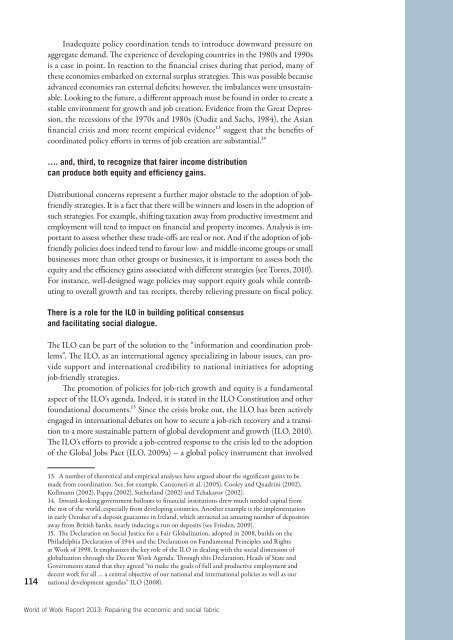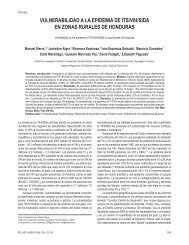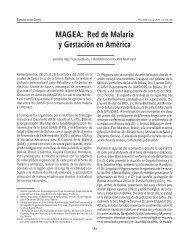World of Work Report 2013 - International Labour Organization
World of Work Report 2013 - International Labour Organization
World of Work Report 2013 - International Labour Organization
You also want an ePaper? Increase the reach of your titles
YUMPU automatically turns print PDFs into web optimized ePapers that Google loves.
Inadequate policy coordination tends to introduce downward pressure on<br />
aggregate demand. The experience <strong>of</strong> developing countries in the 1980s and 1990s<br />
is a case in point. In reaction to the fi nancial crises during that period, many <strong>of</strong><br />
these economies embarked on external surplus strategies. This was possible because<br />
advanced economies ran external deficits; however, the imbalances were unsustainable.<br />
Looking to the future, a different approach must be found in order to create a<br />
stable environment for growth and job creation. Evidence from the Great Depression,<br />
the recessions <strong>of</strong> the 1970s and 1980s (Oudiz and Sachs, 1984), the Asian<br />
fi n a n c i a l c r i s i s a n d m o r e r e c e n t e m p i r i c a l e v i d e n c1 e3 s u g g e s t t h a t t h e b e n efi ts <strong>of</strong><br />
coordinated policy efforts in terms <strong>of</strong> job creation are substantial.14<br />
…. and, third, to recognize that fairer income distribution<br />
can produce both equity and effi ciency gains.<br />
Distributional concerns represent a further major obstacle to the adoption <strong>of</strong> jobfriendly<br />
strategies. It is a fact that there will be winners and losers in the adoption <strong>of</strong><br />
such strategies. For example, shifting taxation away from productive investment and<br />
employment will tend to impact on fi nancial and property incomes. Analysis is important<br />
to assess whether these trade-<strong>of</strong>fs are real or not. And if the adoption <strong>of</strong> jobfriendly<br />
policies does indeed tend to favour low- and middle-income groups or small<br />
businesses more than other groups or businesses, it is important to assess both the<br />
equity and the efficiency gains associated with different strategies (see Torres, 2010).<br />
For instance, well-designed wage policies may support equity goals while contributing<br />
to overall growth and tax receipts, thereby relieving pressure on fiscal policy.<br />
There is a role for the ILO in building political consensus<br />
and facilitating social dialogue.<br />
The ILO can be part <strong>of</strong> the solution to the “information and coordination problems”.<br />
The ILO, as an international agency specializing in labour issues, can provide<br />
support and international credibility to national initiatives for adopting<br />
job-friendly strategies.<br />
The promotion <strong>of</strong> policies for job-rich growth and equity is a fundamental<br />
aspect <strong>of</strong> the ILO’s agenda. Indeed, it is stated in the ILO Constitution and other<br />
foundational documents.15 Since the crisis broke out, the ILO has been actively<br />
engaged in international debates on how to secure a job-rich recovery and a transition<br />
to a more sustainable pattern <strong>of</strong> global development and growth (ILO, 2010).<br />
The ILO’s efforts to provide a job-centred response to the crisis led to the adoption<br />
<strong>of</strong> the Global Jobs Pact (ILO, 2009a) – a global policy instrument that involved<br />
114<br />
13. A number <strong>of</strong> theoretical and empirical analyses have argued about the significant gains to be<br />
made from coordination. See, for example, Canzoneri et al. (2005), Cooley and Quadrini (2002),<br />
Kollmann (2002), Pappa (2002), Sutherland (2002) and Tchakarov (2002).<br />
14. Inward-looking government bailouts to fi nancial institutions drew much needed capital from<br />
the rest <strong>of</strong> the world, especially from developing countries. Another example is the implementation<br />
in early October <strong>of</strong> a deposit guarantee in Ireland, which attracted an amazing number <strong>of</strong> depositors<br />
away from British banks, nearly inducing a run on deposits (see Frieden, 2009).<br />
15. The Declaration on Social Justice for a Fair Globalization, adopted in 2008, builds on the<br />
Philadelphia Declaration <strong>of</strong> 1944 and the Declaration on Fundamental Principles and Rights<br />
at <strong>Work</strong> <strong>of</strong> 1998. It emphasizes the key role <strong>of</strong> the ILO in dealing with the social dimension <strong>of</strong><br />
globalization through the Decent <strong>Work</strong> Agenda. Through this Declaration, Heads <strong>of</strong> State and<br />
Governments stated that they agreed “to make the goals <strong>of</strong> full and productive employment and<br />
decent work for all … a central objective <strong>of</strong> our national and international policies as well as our<br />
national development agendas” ILO (2008).<br />
<strong>World</strong> <strong>of</strong> <strong>Work</strong> <strong>Report</strong> <strong>2013</strong>: Repairing the economic and social fabric

















